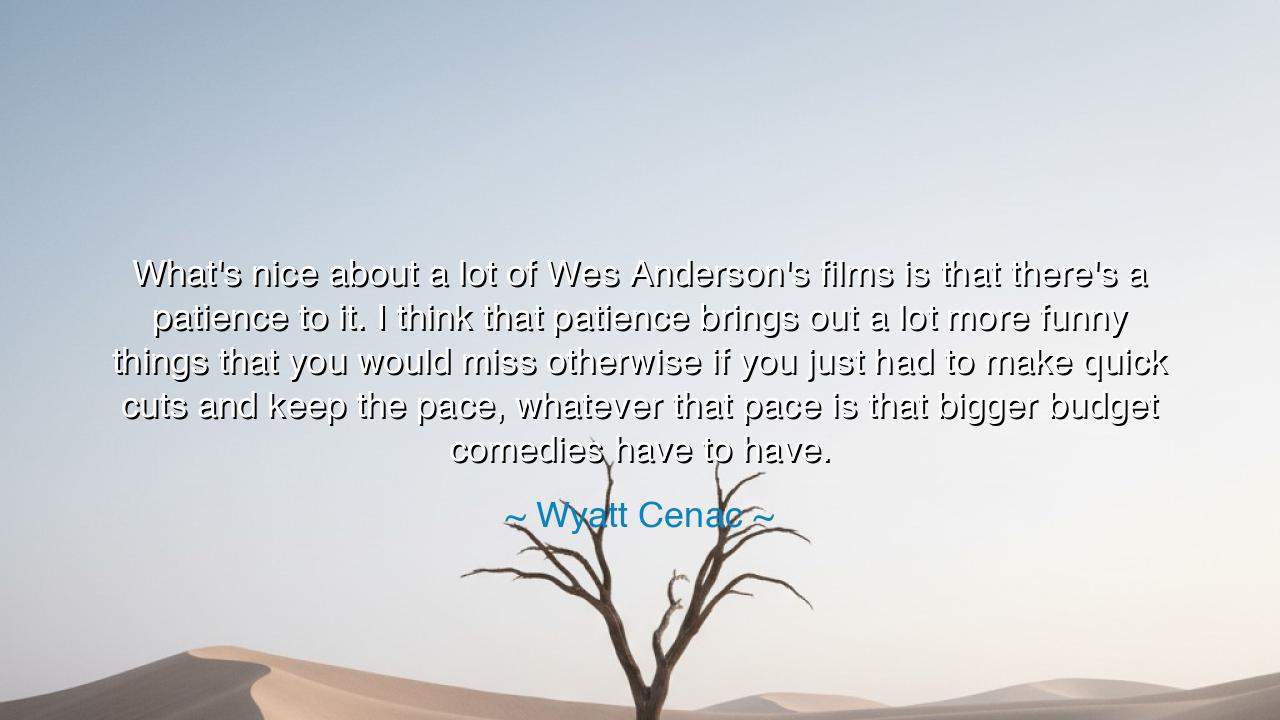
What's nice about a lot of Wes Anderson's films is that there's
What's nice about a lot of Wes Anderson's films is that there's a patience to it. I think that patience brings out a lot more funny things that you would miss otherwise if you just had to make quick cuts and keep the pace, whatever that pace is that bigger budget comedies have to have.






Hear the words of Wyatt Cenac: “What’s nice about a lot of Wes Anderson’s films is that there’s a patience to it. I think that patience brings out a lot more funny things that you would miss otherwise if you just had to make quick cuts and keep the pace, whatever that pace is that bigger budget comedies have to have.” In these words lies not only a reflection on cinema, but a teaching on life itself. For in a world that rushes, that slices moments into fragments, there is wisdom in lingering. There is power in slowing down, in allowing time to breathe, in trusting that truth—whether laughter, beauty, or meaning—will emerge if we grant it space.
The films of Wes Anderson are known for this stillness, for a deliberate rhythm that refuses the frenzy of modern storytelling. They do not force laughter through noise or speed; instead, they allow the humor to bloom in silence, in detail, in the awkward pause, in the unnoticed gesture. Cenac honors this, for he knows that patience is the soil where subtlety takes root. Without it, the surface may shine, but the depths remain unseen. What is true in art is also true in life: the richest treasures often lie beneath the hurried glance.
History itself bears witness to the virtue of patience. The philosopher Laozi spoke of the way of water, which does not rush, yet carves valleys and nourishes life. The dramatists of ancient Greece knew that silence could carry more weight than a chorus, that a pause on stage could make the heart tremble. Even the great generals, like Sun Tzu, taught that a battle won with haste may be lost in spirit, while the commander who waits, observing, allowing events to ripen, can triumph with elegance. Cenac’s praise of Anderson is part of this same lineage—the recognition that pacing, restraint, and timing are forms of power.
Consider, too, the story of Charlie Chaplin. In the age of silent cinema, his humor was not built upon quick cuts, nor upon the excesses of sound and spectacle. It was in the lingering look, the careful stumble, the long wait before a fall that laughter erupted. If he had rushed, the world would have missed the poetry hidden in his comedy. Like Anderson, Chaplin knew that the art of humor rests in patience, in trusting the audience to discover what is funny rather than forcing it upon them.
Cenac’s words remind us that the pursuit of relentless pace is often a trap. The bigger the budget, the more the pressure to dazzle quickly, to fill every moment with sound and motion. Yet in that race, the subtleties vanish: the quiet joke, the unspoken truth, the flicker of humanity. The same is true in our lives. When we hurry through our days, we miss the small joys—the smile of a stranger, the beauty of light on stone, the gentle humor in the ordinary. Patience is not slowness for its own sake; it is attentiveness, the choice to see what would otherwise remain hidden.
Thus, the lesson is clear: whether in art or in life, resist the tyranny of endless haste. Allow your stories, your conversations, your work, even your silences, to unfold with rhythm rather than rush. In doing so, you will discover funny things, profound things, sacred things, that no hurried pace can reveal. Do not fear that the world will pass you by; it is in your stillness that you may finally see the world as it truly is.
Practical wisdom follows. Watch a film slowly, without distraction. Linger in conversation instead of rushing to respond. Walk a road without music in your ears, listening instead to the pauses between sounds. In your work, resist the temptation to cut corners for speed; let your ideas breathe until they ripen. For in these practices, you cultivate the same strength Cenac finds in Anderson’s work—the ability to notice what others miss, to draw laughter, wisdom, and beauty from the spaces between.
So let Cenac’s words be remembered: patience is not only the rhythm of art, but the rhythm of truth. To live without it is to skim the surface of existence; to live with it is to uncover treasures that lie hidden in the depths. And when you practice this patience, you will find, as in Anderson’s films, that the world holds far more wonder—and far more humor—than haste would ever allow you to see.






AAdministratorAdministrator
Welcome, honored guests. Please leave a comment, we will respond soon